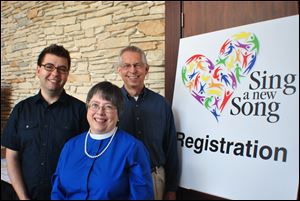
Methodist groups want to advance gay rights
Denomination will vote on changes in 2012
8/26/2011
From left, the Rev. Gregory Gross of Chicago, the Rev. Mary Kay Tottey of Washington, and the Rev. Bruce Robbins of Minneapolis.
HURON, Ohio — Nearly 700 United Methodist clergy and laypersons from throughout the nation are meeting in Huron, Ohio, to discuss efforts to change their denomination’s rules barring ordination of gay clergy and the blessing of same-sex unions. If their efforts fail to change church law at next year’s General Conference — and many reform advocates expect they will be outvoted — a growing number of ministers plan to disregard the rules and start performing same-sex marriages.
“Some may call it disobedience, but we call it obedience to the Gospel,” said the Rev. Gregory Gross, a United Methodist minister who works at an HIV testing clinic in downtown Chicago.
In a group interview with The Blade, the Rev. Mary Kay Totty, pastor of Dumbarton United Methodist Church in Washington, said she feels that her responsibility to the people in her church is a “higher calling than the letter of the law around one specific prohibition.”
The “Sing a New Song” conference, which opened Thursday and continues through Sunday at Sawmill Creek Resort, marks the first time that two large United Methodist reform groups — the Reconciling Ministries Network and the Methodist Federation for Social Action — are holding a joint gathering.
They will be strategizing for General Conference, the denomination’s policymaking body that meets once every four years.
The 1,000 delegates to the April, 2012, conference in Tampa have already been elected by their regional bodies and will vote on resolutions to change the United Methodists’ Book of Discipline, notably its statement that “the practice of homosexuality is incompatible with Christian teaching.”
John Oda, chair of the Reconciling Ministries Network, said the United Methodist Church is “the last holdout” among mainline Protestant denominations, noting that the Evangelical Lutheran Church in America, the Episcopal Church, the Presbyterian Church (U.S.A.), and the United Church of Christ have all changed their rules in recent years on ordination of gay ministers and the blessing of same-sex unions.
A petition started in April by the Rev. Bruce Robbins of Minneapolis, asserting that United Methodist ministers will begin offering “the grace of the church’s blessing to any prepared couple desiring Christian marriage,” has been signed by 1,000 clergy nationwide.
Mr. Gross said the petition shows that proponents of change in the United Methodist Church are running out of patience.
“Even though the institutional church may be stuck in the negative language, there are over 1,000 clergy across the country who are leaning forward into that hope, who are saying that even if the church isn’t going to change in 2012, and even though they didn’t change in 2008, we are there,” he said. “We are celebrating the love of two individuals who have been prepared, who have come before us, who are in our congregations, who want a public witness, and to have their relationship blessed.”
The Rev. David Meredith, pastor of Broad Street United Methodist Church in Columbus, added that “1,000 clergy is just the beginning, and 1,000 clergy doesn’t account for the thousands of lay people who are already there.”
Mr. Meredith read a letter from Bishop Bruce Ough, head of the West Ohio Conference of the United Methodist Church, expressing support for the Sing a New Song conference.
“It is difficult to sing a new song when you are oppressed and beaten, exhausted and confused,” Bishop Ough wrote. “It is difficult to sing a new song when you are excluded, or live in fear, or are forced to endure judgment, ridicule, bigotry, hatred, isolation. It is difficult to sing a new song when the church you love does not love you in return.”
The bishop urged conference attendees “to not grow weary and do not forget that even though the healing may lie ahead of us, it is already a settled fact in the mind of God.”
Mr. Meredith added: “They’re good words. I want action too.”
Mr. Robbins, who wrote a book about the global structures of Methodism, said changing demographics worldwide are raising new obstacles to change.
The United Methodist church has been gaining members in Africa, growing from 3.2 million in 2005 to 4.2 million in 2009, while the U.S. membership during that time period slipped from 8 million to 7.7 million. With the number of delegates to General Conference being capped at 1,000, Africa will have a higher percentage of delegates at next year’s meeting.
Mr. Robbins said the topic of homosexuality is “taboo” in many African nations, and if delegates cannot even talk about the issue it is unlikely the African delegates would vote to change church law.
The conference at Sawmill Creek Resort is offering numerous workshops, “affinity group” meetings, all-day forums, and worship sessions.
Saturday, conference attendees plan to call every U.S. delegate to the General Conference to “build relationships” and express their support for change. The Rev. Cheri Holdridge, pastor of The Village Church in Toledo and a conference speaker, said that because next year’s delegates have been selected, the “die is already cast.” Proponents of change will focus on “the moveable middle,” delegates who have not yet made up their mind, she said.
In a show of support for transgender people, Sing a New Song organizers designated two second-floor bathrooms as “gender-neutral,” explaining in the conference handbook that “transgender people often face the burden of being confronted or questioned about which gender’s restroom they should use.”
Contact David Yonke at:
dyonke@theblade.com
or 419-724-6154.